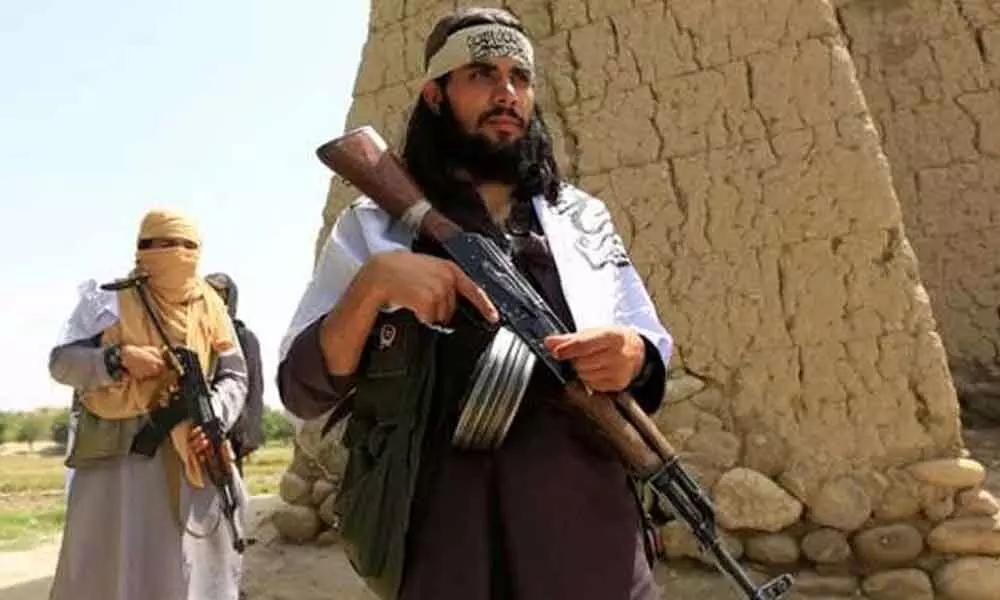Live
- Centre cautiously optimistic on growth
- Awareness camp on child exploitation held at Lendi
- Samantha Opens Up About Divorce and Wedding Gown
- CM’s change of heart due to farmers & BJP fight in Lagacharla: D K Aruna
- Gold rates in Delhi today slashes, check the rates on 26 November, 2024
- Dalal St hogs limelight as BJP shines in Maha
- Gold rates in Vijayawada today slashes, check the rates on 26 November, 2024
- Gold rates in Hyderabad today slashes, check the rates on 26 November, 2024
- Aditya Thackeray elected SS-UBT’s Legislative Party Leader
- Gold rates in Visakhapatnam today slashes, check the rates on 26 November, 2024
Just In
Afghan Taliban doing little to stop Pak counterparts


Representational Image
Each year on January 17, Shahana bakes a cake and invites friends to her home in the Pakistani city of Peshawar.
Each year on January 17, Shahana bakes a cake and invites friends to her home in the Pakistani city of Peshawar. They sing happy birthday for her son, even light a candle. But it's a birthday without the birthday boy. Her son, Asfand Khan, was 15 in December 2014 when gunmen rampaged through his military-run public school in Peshawar killing 150 people, most of them students, some as young as 5. Asfand was shot three times in the head at close range. The attackers were Pakistani Taliban, who seven years later have once again ramped up their attacks, seemingly emboldened by the return of Afghanistan's Taliban to power in Kabul.
In the last week of December, they killed eight Pakistani army personnel in a half dozen attacks and counter attacks, all in the country's northwest. Another two Pakistani soldiers were killed in an attack on Taliban outposts late Wednesday night. The Pakistani Taliban, known by the acronym TTP, are regrouping and reorganizing, with their leadership headquartered in neighboring Afghanistan, according to a U.N. report from July.
That is raising fears among Pakistanis like Shahana of a return of the horrific violence the group once inflicted. Yet the Afghan Taliban have shown no signs of expelling TTP leaders or preventing them from carrying out attacks in Pakistan, even as Pakistan leads an effort to get a reluctant world to engage with Afghanistan's new rulers and salvage the country from economic collapse.
It is a dilemma faced by all of Afghanistan's neighbours and major powers like China, Russia and the United States as they ponder how to deal with Kabul. Multiple militant groups found safe haven in Afghanistan during more than four decades of war, and some of them, like the TTP, are former battlefield allies of the Afghan Taliban. So far, the Taliban have appeared unwilling or unable to root them out.
The sole exception is the Islamic State affiliate, which is the Taliban's enemy and has waged a campaign of violence against them and for years against Afghanistan's minority Shiite Muslims, killing hundreds in dozens of horrific attacks targeting, schools, mosques, even a maternity hospital. Washington has identified the Islamic State branch, known by the acronym IS-K, as its major militant worry emanating from Afghanistan.
The Taliban's long-time ally al-Qaida is not seen as a strong threat. Though US military leaders say there are signs it may be growing slightly, it is struggling near rudderless, with its current leader, Ayman al-Zawahri, alive but unwell, according to the July UN report. Still, there are plenty of other militants based in Afghanistan, and they are raising concerns among Afghanistan's neighbours.
China fears insurgents from its Uighur ethnic minority who want an independent Xinjiang region. Russia and Central Asian nations worry about the Islamic Movement of Uzbekistan, which in recent years went on a recruitment drive among Afghanistan's ethnic Uzbeks. For Pakistan, it is the TTP, which stands for Tehreek-e-Taliban Pakistan. The group perpetrated some of the worst terrorist assaults on Pakistan, including the 2014 assault on the military public school. The TTP numbers anywhere from 4,000 to 10,000 fighters, according to the U.N. report.
It has also succeeded in expanding its recruitment inside Pakistan beyond the former tribal regions along the border where it traditionally found fighters, says Amir Rana, executive director of the Pakistan Institute of Peace Studies, an independent think tank in the capital Islamabad. Analysts say the Afghan Taliban's reluctance to clamp down on the TTP does not bode well for their readiness to crack down on the many other groups. "The plain truth is that most of the terrorist groups operating in Afghanistan, aside from IS-K, are Taliban allies," says Michael Kugelman, deputy director of the Asia Program at the Washington-based Wilson Center. "And the Taliban aren't about to turn their guns on their friends, even with mounting pressure from regional players and the West."
The militants' presence complicates Pakistan's efforts to encourage international dealings with the Afghan Taliban in hopes of bringing some stability to an Afghanistan sliding into economic ruin. Analysts say Pakistan's military has made a calculation that the losses inflicted by the TTP are preferable to undermining Afghanistan's Taliban rulers by pressing them on the issue. A collapse would bring a flood of refugees; Pakistan might be their first stop, but Islamabad warns that Europe and North America will be their preferred destination. Islamabad attempted to negotiate with the TTP recently, but the effort fell apart.

© 2024 Hyderabad Media House Limited/The Hans India. All rights reserved. Powered by hocalwire.com






